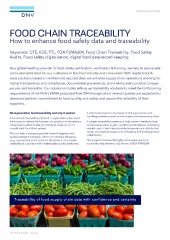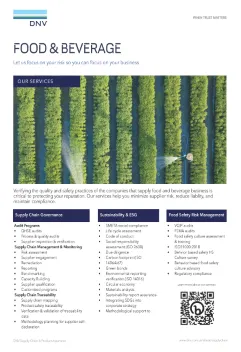Food Chain Traceability
FDA FSMA204, next generation food traceability and why it matters.
A food chain traceability standard is applicable to document the history or identify the location of a product, or the relevant components, either inside an individual company or in a coordinated food chain system. This can help a company provide internal logistical and quality-related information, which can improve efficiency (e.g., appropriate stock rotation). Upstream it can provide credibility to a product with undetectable quality attributes. A safe food product is the result of all the processes and handling activities carried out throughout the entire food chain. A proper traceability system can help create a feedback loop to improve product quality, conditions and delivery, optimizing related costs. It also helps provide transparency in distribution routes and improve supply chain efficiency and trading partner collaboration.
DNV is a trusted expert within the food industry
DNV is not just a technology provider, but has decades of experience within assurance, food safety certification and risk management within the food industry. DNV provides certifications to all GFSI standards and 2nd party & supply chain verification and audits. We provide the food industry with 360-degree Supply Chain Governance.
Our extensive food and beverage services encompass:
- Supply chain audit programs
- Supplier management & monitoring
- Supply chain traceability & digitalization - including FDA FSMA204
FDA FSMA204 and what this means for you
The FDA is proposing to establish additional traceability recordkeeping requirements (beyond what is already required in existing regulations) for persons who manufacture, process, pack, or hold foods the Agency has designated for inclusion on the Food Traceability List. The proposed rule, “Requirements for Additional Traceability Records for Certain Foods” (Food Traceability Proposed Rule) is a key component of the FDA’s New Era of Smarter Food Safety Blueprint and would implement Section 204(d) of the FDA Food Safety Modernization Act (FSMA). Key to this initiative is ensuring the interoperability of data across the value-chain.
At the core of this proposal is a requirement for those who manufacture, process, pack or hold foods on the Food Traceability List (FTL) to establish and maintain records containing Key Data Elements (KDEs) associated with different Critical Tracking Events (CTEs). Source: FDA
The list of food categories ranges from seafoods to fresh produce, and the FTL categories are certain cheeses, shell eggs, nut butter, finfish, crustaceans, mollusks, ready-to-eat deli salads including a list of fresh produce such as cucumbers, herbs, leafy greens, melons, peppers, sprouts, tomatoes, tropical tree fruits.
What data is needed
At very high level, the key data elements (KDEs) associated with critical tracking events of data pertains to data from
- Growing
- Receiving
- Creating (manufacturing/processing)
- Transformation
- Shipping
Compliance dates
Final rule effective 60 days after published in the Federal Register and with 2 years transition for the entities in the supply chain to comply. In addition, the proposed rule would also require that traceability records be provided to FDA as soon as possible but no later than 24 hours after a request is made making accessibility, availability and interoperability key to a successful implementation.
Learn more by downloading one of our brochures below.


